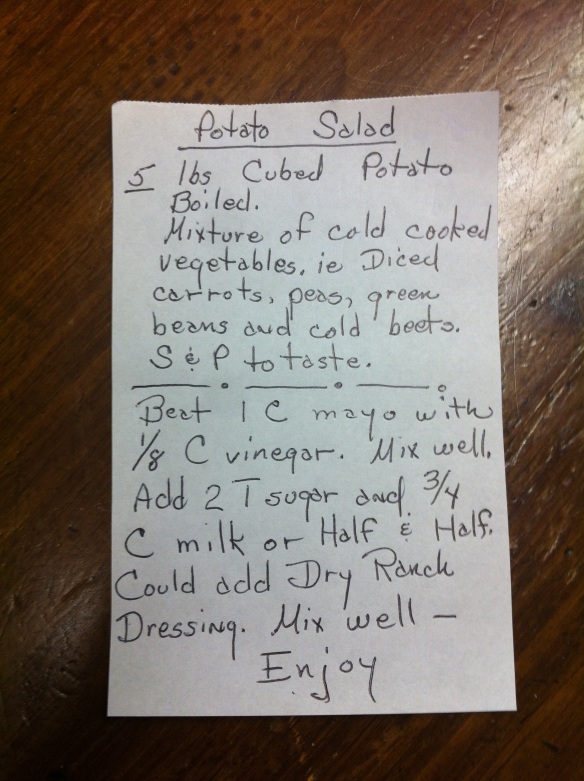Jon’s sweet family sketch in his post last week has stayed with me for days. Even yesterday, as I prepared for a day on the shore with part of my own vast and varied family, his words lingered.
It’s a strange thing, waxing deep over the potato salad. That was my assignment for yesterday’s picnic lunch. In my family, someone is going to make potato salad, it’s just a matter of who. Making the potato salad is, in it’s own small way, an honor and a responsibility. The way I like to make it is, basically, to make it taste as close to my mother’s as I can, while still making it my own. The art is really in the dressing. There needs to be just the right blend of rich, tang, sweet, salt and spice. I’ve studied off and on how my mom makes hers, and have a pretty good feel for my own, having learned at her knee.
This dressing recipe is part of my inheritance. And as I was preparing it yesterday morning, it got me thinking about the inherited blend of rich and bitter, sweet and salt that is family culture. In very large part we pick up thoughts, moods, our ways of relating to the good and the difficult from each other. You could say our communication patterns get handed down to us, starting with our earliest days. You may have inherited entire thought constructs, such as political beliefs or philosophical leanings. Even if you rejected the concrete constructs outright, your way of debating stridently, deciphering with curiosity, or backing away from discussing them might be of the given family form.
My husband Bill always chuckles at me when our family gets together. He says he likes watching me turn into the little sister, the 5th out of six. I guess it must bring out my family inheritance in a very particular way. I will admit to hearing some baudy, naughty, even feisty statements come out of my mouth not infrequently. And I take great pleasure in giving my older siblings, kids, nieces and nephews charge of various life elements for a time, even if it’s just for an afternoon. This can be a meditation form in its own right: noticing the arising of inherited patterns, the good, the bad and the ugly, right out of my own silent or squawking mouth, right from my intermittently helpful and lazy hands.
Some family bequests are of the roughest sort. In our clearest moments I think we all agree that the worst ones, such as physical or verbal abusiveness, have no rightful place in a nurturing culture. And yet, these inheritances continue to be handed on, generation to generation. Where does such an inheritance originate? With everyone agreeing it’s unacceptable, who chose it in the first place? It would be arguably easier to document the provenance of a Dark Ages mallet than it would be to find the origin of vindictiveness in a family, say.
There are all manner of inherited family patterns. Sunniness, strong work ethic, pessimism, intellectualism: you can find things you love about yourself and inherited bits you’d just as soon get rid of, if you could. I’d say it’s a critical part of the art of being you, determining what parts of the overall mix really serve, what heirlooms should be preciously maintained, and which parts you’d do better walking away from or even dismantling with courageous self-discipline.
What are your heirlooms? Are their inheritances you’d like to stop handing down?
~ Margaret


I’ve spent many hours over the years considering this very subject. What I wonder is just how much of who we are (manner, demeanor, affect, etc) is genetic and maybe hard-coded, and how much is imprinted or programmed, and therefore reprogrammable. Science may never be able to fully answer this question; but it sure would be useful information when we’re choosing which aspects of ourselves to work on (to walk away from, or dismantle, to use your words) and dedicating time and resources to the effort. Kind of reminds me of the Serenity Prayer…
The science of meditation and neurobiology keeps astounding us with what turns out is malleable, thru good hearted attention. Most recently we have seen how gene damage can be repaired in an 8-week MBSR intervention. Keep wondering, and see where the questions take you! ~Margaret
wonderful article. we choose the heirlooms that we pass on and the others were meant to be a part of our past.
Thank you, Bob. Knowing that there’s choice is the big eye-opener, in my book. ~ Margaret
This is a beautiful piece. It made me smile and brought back great memories. Though they were bitter and sweet, they were welcomed. Thank you for this gift.